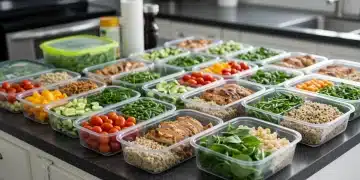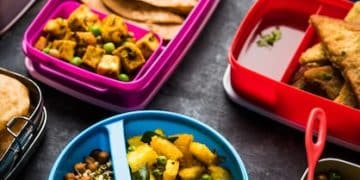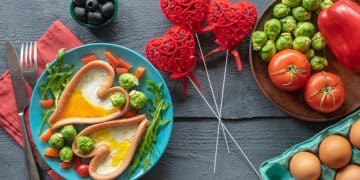Meal prep strategies for a healthy week: maximize your time

Meal prep strategies for a healthy week involve planning meals in advance, utilizing key ingredients, applying time-saving cooking techniques, and knowing how to store and reheat meals effectively for convenience and nutrition.
Are you ready to transform your week with meal prep strategies for a healthy week? Imagine saving time each day while enjoying nutritious meals. In this guide, we’ll dive into efficient techniques that can make meal prepping feel like a breeze.
Understanding the basics of meal prep
Understanding the basics of meal prep is essential for anyone looking to eat healthier and save time. It can help to know the right strategies to make your week easier.
Planning Your Meals
Start by making a meal plan for the week. This allows you to know exactly what to cook and how much you’ll need. Consider your schedule and choose meals that fit your lifestyle. For instance, if you have a busy Monday, maybe prepare something simple that can be reheated quickly.
- Choose a variety of proteins like chicken, fish, or plant-based options.
- Incorporate lots of fruits and vegetables for balanced nutrition.
- Consider your cooking methods: baking, steaming, or stir-frying can be quick and easy.
- Plan for snacks to avoid unhealthy choices during the week.
After you have your plan, the next step is to create a shopping list. This will save time and ensure you have everything needed for your meals. Stick to the list while shopping to avoid impulse buys.
Batch Cooking
Batch cooking is a fantastic technique in understanding the basics of meal prep. This involves cooking large portions of food at once, which can then be divided into smaller meals. Preparing multiple servings allows you to save energy and time throughout the week. Think about making soups, casseroles, or stir-fry dishes that can be easily reheated.
While batch cooking, it’s also important to use proper storage containers. Use clear, airtight containers to keep meals fresh. Label your containers with dates for easy identification. This will help you keep track of which meals need to be eaten first.
Now that you’ve prepared your meals, remember to store them in appropriate locations. Meals can typically last in the fridge for 3-4 days, while many can be frozen for longer storage. This means you can enjoy a variety of meals without monotony.
Meal prepping not only brings structure to your meals but also promotes creativity in the kitchen. Don’t hesitate to experiment with different recipes or flavor combinations. Find what you enjoy most and make it part of your routine!
Key ingredients for easy meal prep

When it comes to meal prep, knowing the key ingredients is crucial for creating delicious and healthy meals. By choosing the right base ingredients, you can save time and enhance flavor.
Proteins
Proteins are essential in any meal plan. They help keep you full and provide energy. Consider options like chicken, fish, beans, and tofu. These can easily be cooked in large batches and stored for the week.
- Chicken breast: versatile and easy to flavor.
- Salmon: rich in healthy fats and quick to cook.
- Chickpeas: great for salads and stews.
- Tofu: an excellent plant-based protein.
Mixing different proteins throughout the week can keep meals interesting. Don’t forget to marinate them before cooking for added taste!
Grains and Carbs
Next up are grains and carbs, which provide essential energy. Options like brown rice, quinoa, and whole-grain pasta are great choices. They can be prepared ahead of time and served with various proteins and vegetables.
By having a couple of grains ready to go, it becomes easy to combine them with proteins and vegetables for quick lunches or dinners.
Consider making a big batch of quinoa or rice at the beginning of the week. Store them in the fridge or freezer, and you’ll always have a healthy base for your meals.
Fruits and Vegetables
Fruits and vegetables are key to a balanced diet. Incorporate a variety of colors for maximum nutrients. You can chop veggies like bell peppers, carrots, and broccoli ahead of time, making it easy to add them to any meal.
- Spinach: great for salads and smoothies.
- Carrots: perfect for snacking or adding to dishes.
- Broccoli: can be steamed or roasted for quick side dishes.
- Seasonal fruits: berries and apples can be great for snacks.
Pre-portion your fruits for easy snacks and quick smoothie blends. Having vibrant options ready will make healthy eating easier and more enjoyable.
By focusing on these key ingredients, meal prep can become a simple and enjoyable process. Keep your pantry stocked with these essentials, and you’ll find that creating nutritious meals becomes a breeze every week.
Time-saving cooking techniques
When looking to enhance your meal prep, incorporating time-saving cooking techniques can make a big difference. These techniques not only help you cook faster but also improve efficiency in your kitchen.
Use One-Pot Meals
One-pot meals are a great way to simplify cooking. Instead of using multiple pots and pans, you can combine ingredients in one dish. This reduces clean-up time and allows flavors to blend beautifully.
- Soups and stews: Perfect for simmering various ingredients together.
- Casseroles: Easy to prepare and can be packed with nutrients.
- Stir-fries: Quickly cooked and customizable with veggies and proteins.
By using one-pot methods, you ensure a hearty meal with less effort.
Batch Cooking
Batch cooking is another useful method that contributes to meal prep success. This technique involves preparing larger quantities of food and storing portions for future meals. For example, you can cook a big pot of chili or a large tray of roasted vegetables.
Not only does this save time during busy days, but it also cuts down on food waste. Freeze leftover meals in airtight containers for later use.
Prep Ahead
Prepping ingredients ahead of time can also save valuable minutes in the kitchen. Spend some time on the weekend washing, chopping, and measuring ingredients. Store them in clear containers in the fridge for easy access.
When you’re ready to cook, everything will be organized and ready to go, which speeds up your cooking process significantly.
Utilizing these time-saving cooking techniques can turn meal prep from a daunting task into an enjoyable and streamlined process. Not only will you save time, but you’ll also encourage healthier eating habits.
How to store and reheat meals effectively

Knowing how to store and reheat meals effectively is just as important as preparing them. Proper storage helps maintain freshness and nutrition while ensuring that your meals are safe to eat.
Storage Tips
Start by choosing the right containers. Use airtight containers made of glass or BPA-free plastic to keep your food fresh. Make sure to let hot meals cool down before sealing them. This prevents condensation, which can lead to spoilage.
- Label containers with the date they were prepared.
- Store cooked meals in the fridge if they will be eaten within 3-4 days.
- For longer storage, consider freezing meals.
- Use 1-serving portions for easy thawing and reheating.
Organizing your fridge or freezer can also make a difference. Keep older meals at the front so you use them first and ensure nothing goes to waste. Group similar items together, and maintain a clean area for meal prep.
Reheating Methods
When it comes to reheating, choose methods that keep your food moist and flavorful. Microwaves are quick but can sometimes dry out meals. Instead, consider using the oven or stovetop for more even heating.
Here are a few reheating techniques:
- Microwave: Cover meals with a damp paper towel to retain moisture.
- Oven: Reheat at a low temperature to avoid drying out.
- Stovetop: Use a bit of water or broth to steam heat leftovers.
By following these guidelines on how to store and reheat meals effectively, you can ensure that your efforts in meal prep result in delicious, convenient meals throughout the week. This will not only save you time but also help you enjoy fresh, healthy food daily.
FAQ – Frequently Asked Questions about Meal Prep Strategies
What are the benefits of meal prepping?
Meal prepping saves time during busy weeks, helps control portion sizes, and promotes healthier eating habits by reducing the temptation to order takeout.
How long can I store meal prepped foods in the fridge?
Most meal preps can be safely stored in the fridge for 3-4 days. Meals can also be frozen for longer storage.
What types of meals are best for meal prepping?
One-pot meals, casseroles, soups, and baked dishes work great for meal prepping as they reheat well and maintain flavor.
How can I keep my meal prep interesting?
To keep meals exciting, try using different spices, rotating ingredients, and incorporating various cooking methods; this helps prevent meal fatigue.





